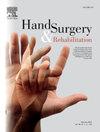HAND-Q的德语翻译与语言验证。
IF 1
4区 医学
Q4 ORTHOPEDICS
引用次数: 0
摘要
背景:手部损伤会严重影响身体功能和生活质量。患者报告的结果测量(PROMs)对于获取患者观点至关重要。hand - q是一款经过验证的模块化PROM,专为手部疾病患者开发。为了支持在讲德语的人群中使用,需要一个符合文化的德文版本。方法:按照WHO和ISPOR指南进行翻译和语言验证。两个独立的正向翻译由一个专家小组协调,然后是一个与原英文版本比较的反向翻译。与HAND-Q开发人员解决了差异。8名上肢损伤患者参加了认知汇报访谈,以评估清晰度和文化相关性。结果:翻译过程中的微小差异与反应一致性、文化差异和性别中立语言有关,并通过专家共识得到解决。认知访谈对五个项目进行了修改。最终的德语(瑞士)HAND-Q包括14个量表133个项目,与原版保持概念上的等同。结论:德国HAND-Q成功翻译并验证了临床和研究使用。它能够标准化评估讲德语的手部疾病患者的结果,支持以患者为中心的护理和手外科研究。本文章由计算机程序翻译,如有差异,请以英文原文为准。
German translation and linguistic validation of the HAND-Q
Background
Hand injuries can severely affect physical function and quality of life. Patient-reported outcome measures (PROMs) are vital for capturing patient perspectives. The HAND-Q is a validated, modular PROM developed for individuals with hand conditions. To support its use in German-speaking populations, a culturally adapted German version was needed.
Methods
Translation and linguistic validation followed WHO and ISPOR guidelines. Two independent forward translations were reconciled by an expert panel, followed by a backward translation compared with the original English version. Discrepancies were resolved with the HAND-Q developers. Eight patients with upper extremity injuries participated in cognitive debriefing interviews to assess clarity and cultural relevance.
Results
Minor discrepancies during translation were related to response consistency, cultural nuances, and gender-neutral language and were resolved through expert consensus. Cognitive interviews led to revisions in five items. The final German (Switzerland) HAND-Q includes 14 scales and 133 items, maintaining conceptual equivalence with the original.
Conclusions
The German HAND-Q was successfully translated and validated for clinical and research use. It enables standardized assessment of outcomes in German-speaking patients with hand conditions, supporting both patient-centred care and hand surgery research.
求助全文
通过发布文献求助,成功后即可免费获取论文全文。
去求助
来源期刊

Hand Surgery & Rehabilitation
Medicine-Surgery
CiteScore
1.70
自引率
27.30%
发文量
0
审稿时长
49 days
期刊介绍:
As the official publication of the French, Belgian and Swiss Societies for Surgery of the Hand, as well as of the French Society of Rehabilitation of the Hand & Upper Limb, ''Hand Surgery and Rehabilitation'' - formerly named "Chirurgie de la Main" - publishes original articles, literature reviews, technical notes, and clinical cases. It is indexed in the main international databases (including Medline). Initially a platform for French-speaking hand surgeons, the journal will now publish its articles in English to disseminate its author''s scientific findings more widely. The journal also includes a biannual supplement in French, the monograph of the French Society for Surgery of the Hand, where comprehensive reviews in the fields of hand, peripheral nerve and upper limb surgery are presented.
Organe officiel de la Société française de chirurgie de la main, de la Société française de Rééducation de la main (SFRM-GEMMSOR), de la Société suisse de chirurgie de la main et du Belgian Hand Group, indexée dans les grandes bases de données internationales (Medline, Embase, Pascal, Scopus), Hand Surgery and Rehabilitation - anciennement titrée Chirurgie de la main - publie des articles originaux, des revues de la littérature, des notes techniques, des cas clinique. Initialement plateforme d''expression francophone de la spécialité, la revue s''oriente désormais vers l''anglais pour devenir une référence scientifique et de formation de la spécialité en France et en Europe. Avec 6 publications en anglais par an, la revue comprend également un supplément biannuel, la monographie du GEM, où sont présentées en français, des mises au point complètes dans les domaines de la chirurgie de la main, des nerfs périphériques et du membre supérieur.
 求助内容:
求助内容: 应助结果提醒方式:
应助结果提醒方式:


